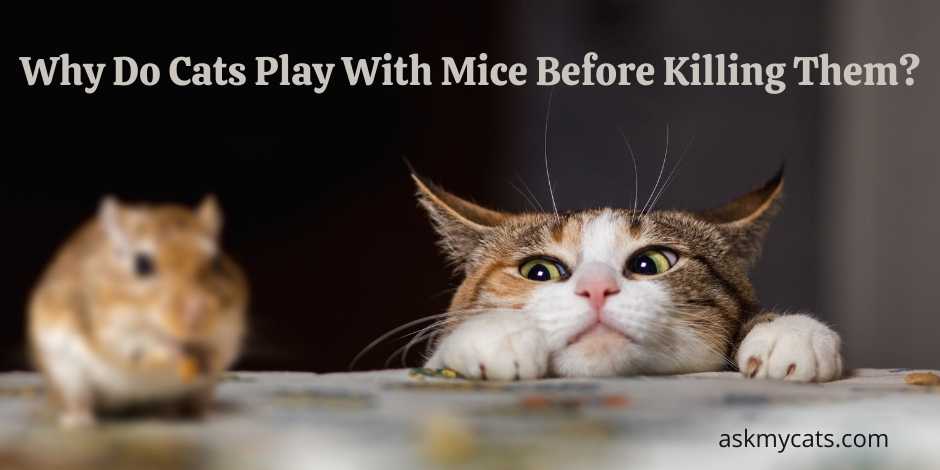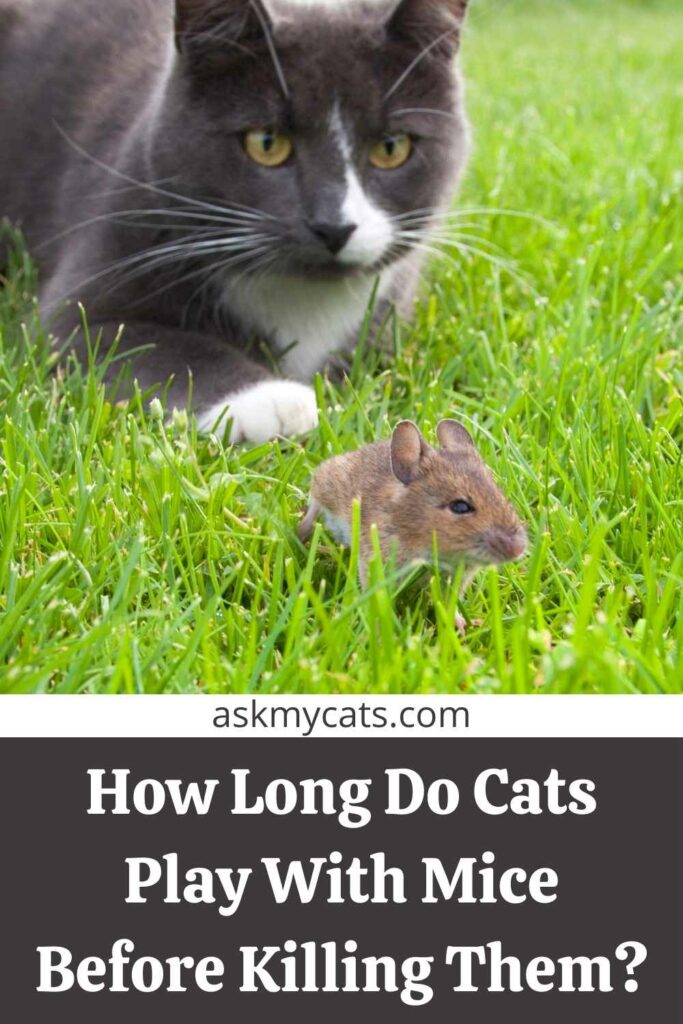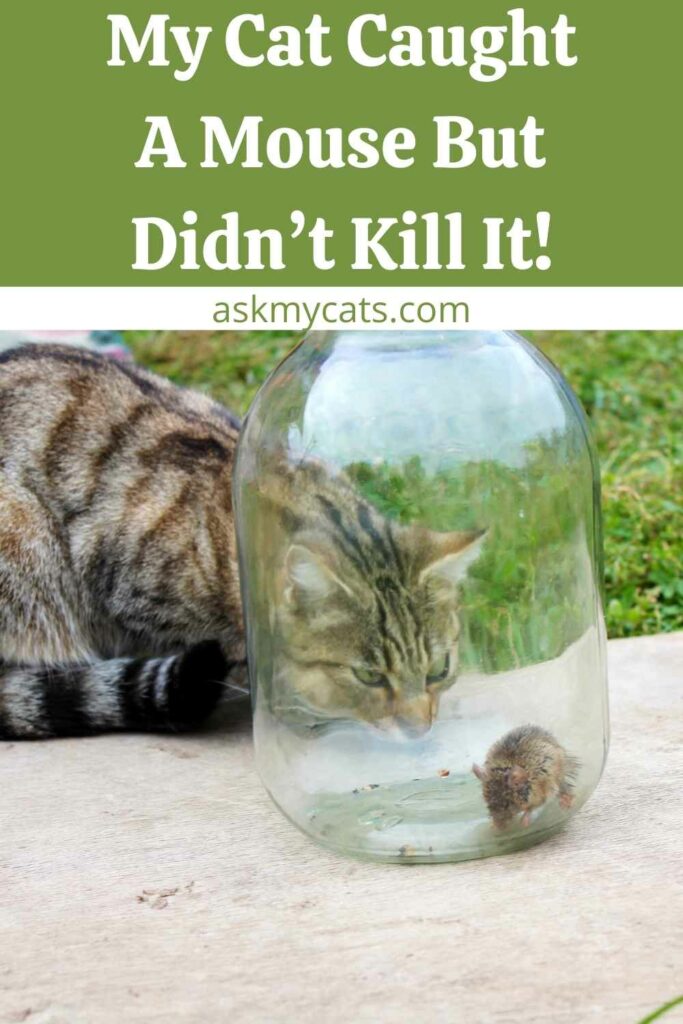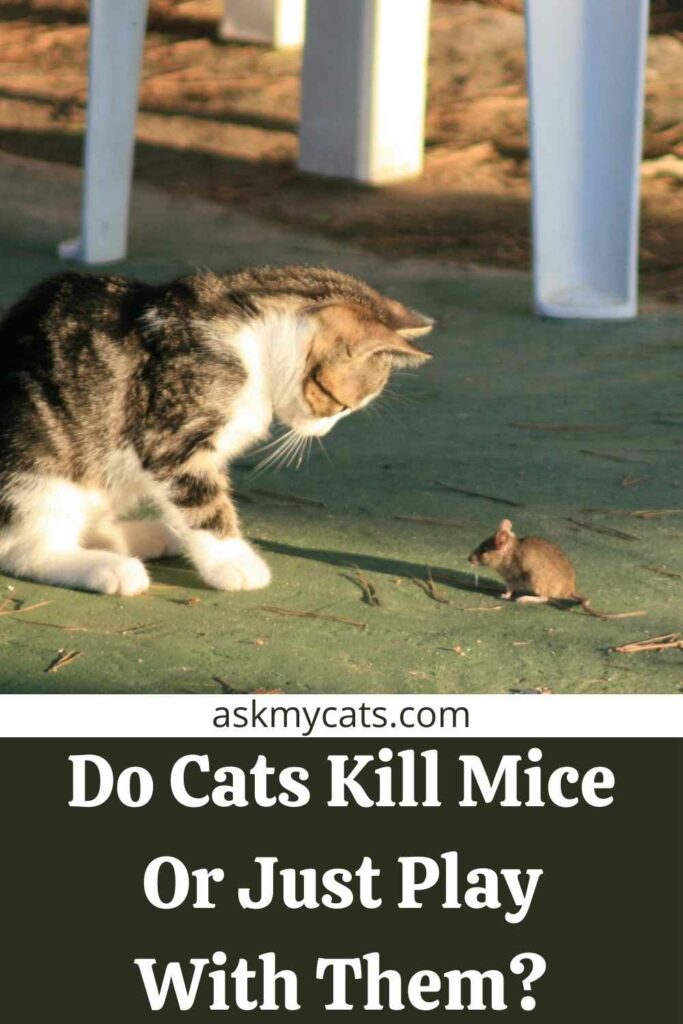Owning a cat means accepting the feline instinct. Cats are natural hunters; therefore, they frequently kill live prey like mice or birds.
A cat will appear to play with a tiny animal before killing it. While it appears that the cat is being cruel, it is behaving out of self-preservation rather than malice.
While hunting rodents, cats play with their prey to sedate it before delivering a deadly blow, which can be perilous. Mice and rats will bite one other to stay alive. This might cause cat pain or spread sickness. Small animals get weary or wounded when they play with prey by hitting or tossing it. After then, the cat can safely kill and end a hunt.
It’s terrible to see a cat play with prey, but you have to let nature take its course. Both animals will suffer if the hunt is disrupted.
The cat’s instincts will be hindered, and the prey animal will most likely perish as a result. Allowing a cat to complete the task is usually faster and cleaner.


Give Your Cat the Perfect Day
Get the Free Ebook!
How Long Do Cats Play With Mice Before Killing Them?
Before killing mice, most cats will play with mice for a few minutes. This can change depending on the cat’s appetite, enthusiasm, and energy levels.

Some cats chase mice to amuse themselves, while others hunt for sustenance. This may influence how they interact with the mice.
Cats are excellent hunters; therefore, it’s only natural to pursue mice or rats.
When a cat hears mice nearby, its ears perk up, and this anticipation might lead to them chasing after them. Many homeowners are aware that their cats will capture mice scurrying around the house since it is normal for them to do so.
A cat that is only looking for amusement will most likely drag things out. It’s part of the appeal since they’re looking for mice inside or outside the house.
My Cat Caught A Mouse But Didn’t Kill It!
If your cat caught a mouse but didn’t kill it, it means that he is not interested in eating the mouse.

A cat’s energy levels will be reduced if it spends a lot of time hunting a mouse. Running around attempting to catch the mouse might become a workout for the cat.
This indicates that it may prefer to finish the job rather than toy with the kill. This is a normal impulse that a cat would have if it were hungry in the wild.
When a cat is hunting on an empty stomach, it will seek a quick kill. This is to save energy because there are no calories to burn.
On the other hand, a well-fed cat will chase the mouse for fun. This indicates that it will spend some time with the mouse before killing it.
A hungry cat will try to eat as rapidly as possible to conserve energy while acquiring a meal. When hunting mice, this can result in an immediate kill.
When a cat isn’t hungry, it will play with the mouse for quite some time. When it comes to hunting mice, each cat is different.
Some cats will do that since it is a natural behaviour for them. On the other hand, others will consider it a nuisance and wish to kill the mouse to stop it from running around.
Cats are known to spend a lot of time hunting mice and are far more likely to enjoy the kill while they are still energetic.
Each cat has its point of view.
If the cat acts by its normal instincts, it may consider playing with the mouse to maintain the high of hunting live prey.
Some cats are renowned for playing with mice for a few minutes before killing them. However, this depends on the cat and how it is feeling at the time. There are no hard and fast rules when it comes to anything like this.
How Do Cats Kill Mice Without Blood?
Cats usually shatter the neck or spine of the mouse. There will usually be few claws or teeth marks on the deceased mouse or rat, and there will be no blood. This is how a wild cat kills its victim.
They take it by the neck and shake it or hurl it in the air until the vertebrae in the neck shatter. No nerve impulses can travel anywhere when the spinal cord is cut. The victim is transformed into a puppet with its strings severed.
Many cats may nip the base of the spine to paralyse but not kill their victims, causing internal bleeding and severe shock.
Even if the cat is shooed away and their victim is rescued, playing with it will create enough stress to kill them.
Do Cats Kill Mice Or Just Play With Them?
Cats love to torture their prey by playing before killing them.

Rodents, like cats, are controlled by instinct. Cats are naturally drawn to pursue tiny creatures, yet prey prefers to live. This means that a mouse or rat will spend all of its resources fighting back. Cats are aware of the threats.
Usually, a feline’s deadly blow is delivered with its teeth. A forceful bite from the cat will sever the spine of a rodent or bird. Prey that chooses to fight back will have access to the eyes or nose due to this.
Although rodents are tiny, they are fierce warriors. If a mouse is cornered and unable to flee, it will bite a stalking cat. The cat will be in many agonies if the bite is targeted towards the eyes or nose.
Rodents can potentially spread a variety of zoonotic illnesses. These are diseases that may be spread from one animal to another. Your cat may become ill if a ferocious rodent bites it. Some of these illnesses are even lethal.
Batting prey around is not tortured from a cat’s viewpoint. By any standard definition, the cat is not playing with its prey. The cat is acting out of self-preservation rather than play. Before delivering a fatal strike, cats do everything to tyre and stun their victim.
A cat subduing its victim is referred to as torture or playing with prey by others. Then, and only then, it would be confident in wrapping up its quest. It’s pointless to attempt the final stage when the victim is still alive.
Do Cats Kill Mice For Fun?
Yes, cats can kill mice for fun and showcase their hunting skills.
All cats, including domesticated kinds, are born with a natural hunting instinct. This is a relic from the wild ancestors of cats. It is foolish and impractical to expect a cat not to hunt. It’s asking a cat to disregard its instincts.
Different cats love to hunt in different ways. Some people relish the challenge of hunting formidable prey. Others choose to go after more straightforward prey. What matters is that the search is done. Dopamine is released into the cat’s brain as a result of this.
Cats seek food in the wild. While this still holds for wild cats, it does not apply to pets. You provide your cat with all of the food it needs. Domesticated cats are now forced to hunt for fun rather than survival. The cat satisfies its impulses before deciding what to do next.
Some cats will walk away from the body, leaving it where it is. However, most cats will see a corpse as a prize. Hunting is a physically demanding activity. Your cat will almost certainly desire a memento of its efforts.
Check to see whether the dead animal is in your cat’s bed. When a prey animal begins to degrade, health risks become more widespread.
Many cats will give their kill to their owner as a gift. This is meant to be a compliment. If you’re hungry, the cat demonstrates that it can catch food. The cat anticipates being lauded for its hunting abilities. Even if you’re not happy, provide this encouragement.
Play is essential for a cat’s hunting impulse to be satisfied. The same reflexes are triggered when hunting in the wild while chasing a laser pointer or a feather on a stick. The more you play these games, the less likely a cat will attack natural prey.
Do Cats Play With Mice Until They Die?
Yes, cats can play with mice until they die. They can also play with their dead prey.
Some cats play with their prey even after it has died. There are three possible reasons for this.
The first explanation is that the cat is being cautious. It may be unaware that it has effectively terminated the life of a bit of mammal. It will continue to swat and toss the prey until it is satisfied. The cat will eventually become bored and abandon the hunt.
It’s also conceivable that the cat’s instinct hasn’t been satisfied yet. The cat is dissatisfied with how swiftly it dispatched the victim. For its gratification, it continues to carry out hunting rituals. Again, the cat will soon tyre of this.
Finally, the prey might be mistaken for a toy by the cat. According to research published in the Journal of Veterinary Behaviour, furry mice are the favoured toy for the majority of cats. If your cat has one of these toys, it may be treating a live mouse as a toy.
Provide a diversion if you notice your cat playing with a dead animal. Dispose of the body once your cat’s attention is diverted elsewhere. Keeping a deceased animal is unsanitary. By placing the carcass in its mouth, the cat may become ill.
Frequently Asked Questions
Why do cats love killing mice?
As cats are sociable animals, they may be concerned about humans’ underdeveloped hunting instincts, and bringing dead animals may be an attempt to teach us how it’s done. Mice are occasionally killed by cats feeling benevolent and wish to give their owner a thoughtful gift.
Do mice play dead?
Mice are nocturnal creatures, meaning they are awake while humans are asleep. When mice are threatened, they pretend to be dead until the threat has gone. Mice come in approximately 30 different species.
Can a cat smell a mouse?
Cats have a keen sense of smell, which aids them in detecting rodents in the home. It is 14 times more powerful than humans. They smell out the mice’s musky odour and nest using their 200 million odour receptors in the nose.
Final Words
Playing with mice before killing appears to be a happy act of cruelty for cats. It is critical to keep in mind that this is not the case. Your cat is merely guarding itself and responding on instinct. It is better to subdue prey before killing it than to give it a chance to react.
Drop your questions in the comments section below.
